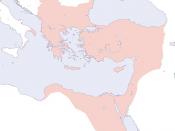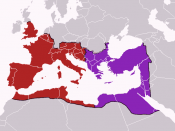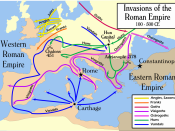In a series of articles and addresses which culminated in the book Mohammed and Charlemagne, Pirenne advanced the thesis that the Ancient World ended only after the Arab invasions of the seventh and eighth centuries had swept around the perimeter of the Mediterranean and had converted it into a Moslem lake upon which, as one Arab writer graphically said, the Christians could no longer "float a plank."
The waters of the Mediterranean have held the Roman empire like cement; over its waters had passed trade and commerce, the Roman military and naval might, and the vital exchange of ideas. The German tribes that had occupied the western Empire had not, according to Pirenne, destroyed this Mediterranean unity of the Roman Empire. They had, in fact, admired the superior civilization and had labored to continue it; the German chiefs had mimicked the Roman emperors in dress and ceremony, had appropriated Roman government, had continued to use the civitas as the center of administration, had employed the gold coinage of Diocesan and Constantine, and had done what they could to preserve Roman culture.
Though these German kingdoms had had no effective political ties with the eastern half of the Empire, they had still partaken of the Mediterranean unity and had enjoyed unbroken economic exchange with the East and because of this the Empire has not fallen into the dark ages.
The Conventional date for the Fall of the Roman Empire is 476 AD but Pirenne looks not at the disruption of the government by Germanic tribes but at the exchange of trade and culture, which at this point is still ongoing. Pirenne gives evidence that goods like papyrus continued to be traded between east and west that eastern merchants could be found in western ports, that eastern products like spices continued...


